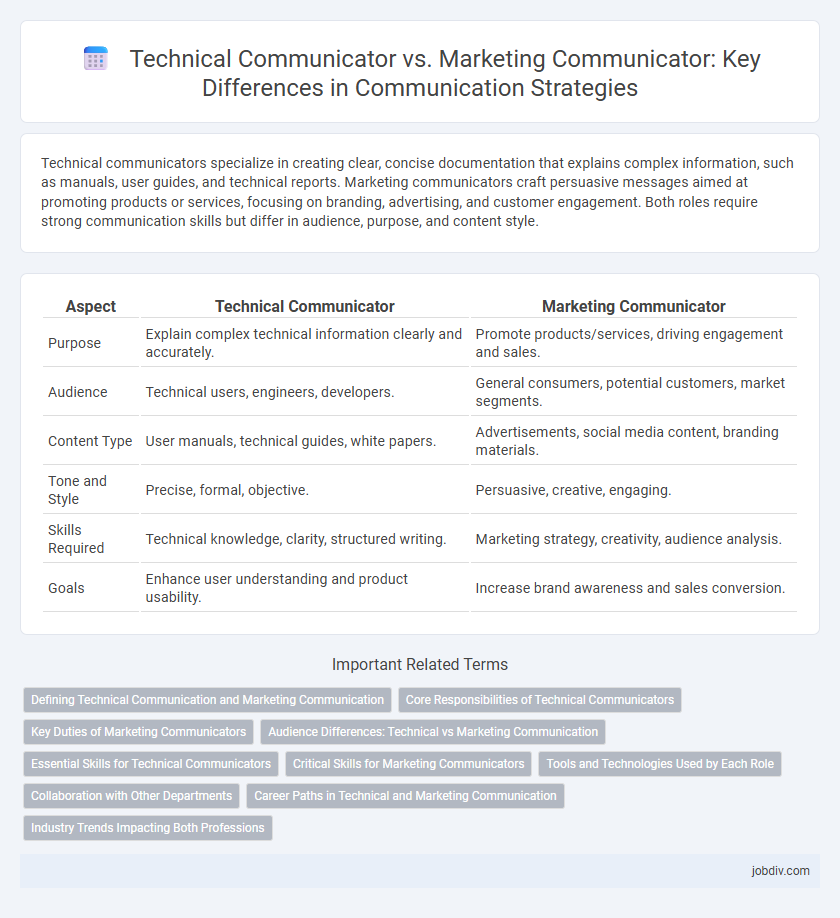Technical communicators specialize in creating clear, concise documentation that explains complex information, such as manuals, user guides, and technical reports. Marketing communicators craft persuasive messages aimed at promoting products or services, focusing on branding, advertising, and customer engagement. Both roles require strong communication skills but differ in audience, purpose, and content style.
Table of Comparison
| Aspect | Technical Communicator | Marketing Communicator |
|---|---|---|
| Purpose | Explain complex technical information clearly and accurately. | Promote products/services, driving engagement and sales. |
| Audience | Technical users, engineers, developers. | General consumers, potential customers, market segments. |
| Content Type | User manuals, technical guides, white papers. | Advertisements, social media content, branding materials. |
| Tone and Style | Precise, formal, objective. | Persuasive, creative, engaging. |
| Skills Required | Technical knowledge, clarity, structured writing. | Marketing strategy, creativity, audience analysis. |
| Goals | Enhance user understanding and product usability. | Increase brand awareness and sales conversion. |
Defining Technical Communication and Marketing Communication
Technical communication involves creating clear, precise documentation such as manuals, user guides, and software instructions to simplify complex information for technical audiences. Marketing communication focuses on crafting persuasive messages, brand narratives, and promotional content aimed at engaging target customers and driving sales. Both roles require specialized skills, but technical communication prioritizes accuracy and usability while marketing communication emphasizes creativity and audience appeal.
Core Responsibilities of Technical Communicators
Technical communicators specialize in creating clear, concise documentation such as user manuals, product guides, and instructional materials tailored for technical audiences. They translate complex technical information into accessible content that ensures proper product use and compliance with industry standards. Their core responsibilities include collaborating with engineers and subject matter experts to gather accurate data, organizing information logically, and maintaining up-to-date technical documents for various platforms.
Key Duties of Marketing Communicators
Marketing communicators create targeted messaging to promote products or services, crafting compelling campaigns that enhance brand visibility and customer engagement. They analyze market trends, audience behavior, and competitor strategies to tailor content that drives sales and builds customer loyalty. Their key duties include managing social media platforms, developing promotional materials, and coordinating with sales teams to align communication efforts with business goals.
Audience Differences: Technical vs Marketing Communication
Technical communicators target specialized audiences such as engineers, developers, or end-users who require precise, detailed information to understand complex products or processes. Marketing communicators focus on broader, less technical audiences, aiming to engage customers through persuasive messaging that highlights benefits and brand value. Understanding these audience differences shapes the tone, content depth, and delivery style essential for effective communication in each field.
Essential Skills for Technical Communicators
Technical communicators excel in translating complex information into clear, concise content, mastering skills such as audience analysis, document design, and proficiency with authoring tools like XML and Markdown. They prioritize accuracy, usability, and consistency, ensuring technical manuals, user guides, and API documentation meet the needs of specialized audiences. Unlike marketing communicators who focus on persuasion and brand messaging, technical communicators rely heavily on structured writing, data visualization, and adherence to industry standards to facilitate effective knowledge transfer.
Critical Skills for Marketing Communicators
Marketing communicators excel in storytelling, audience segmentation, and brand messaging to create compelling campaigns that drive customer engagement and sales. Mastery in digital analytics, SEO, and social media platforms is crucial for optimizing content reach and measuring campaign effectiveness. Strong collaboration skills and market research expertise enable marketing communicators to align messaging with consumer behavior and market trends.
Tools and Technologies Used by Each Role
Technical communicators primarily utilize tools like MadCap Flare, Adobe FrameMaker, and XML editors to produce detailed manuals, user guides, and technical documentation, emphasizing accuracy and clarity. Marketing communicators rely on platforms such as HubSpot, Canva, and Google Analytics to craft engaging content, manage campaigns, and analyze audience engagement metrics. Both roles leverage content management systems (CMS) like WordPress, but their technology usage diverges according to their distinct objectives and target audiences.
Collaboration with Other Departments
Technical communicators excel in collaborating with engineering, product development, and quality assurance teams to translate complex technical information into clear, user-friendly documentation. Marketing communicators work closely with sales, branding, and market research departments to craft persuasive messages that resonate with target audiences and drive engagement. Both roles require strong cross-departmental communication skills to ensure consistency and effectiveness in messaging across company channels.
Career Paths in Technical and Marketing Communication
Technical communicators specialize in creating clear, concise documentation such as user manuals, white papers, and product specifications to support complex technological products. Marketing communicators focus on crafting persuasive messages, brand storytelling, and promotional content to enhance customer engagement and drive sales. Career paths in technical communication often lead to roles like information architect or content strategist, while marketing communication careers may progress toward brand manager or digital marketing director positions.
Industry Trends Impacting Both Professions
Rapid advancements in digital technologies and the rise of AI-driven tools are reshaping both technical and marketing communication by enhancing content personalization and delivery speed. Industry trends such as augmented reality, interactive content, and data analytics demand that technical communicators develop skills in complex information design while marketing communicators focus on consumer engagement metrics and brand storytelling. Both professions increasingly rely on cross-functional collaboration to leverage real-time data and ensure consistency across multi-channel communication platforms.
Technical Communicator vs Marketing Communicator Infographic

 jobdiv.com
jobdiv.com